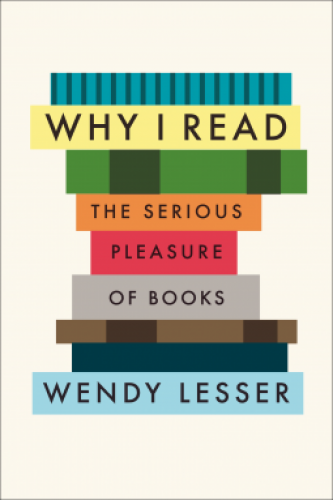Two centuries ago it would have been reflex to name the dominant novelist or poet of your generation; eclectics might’ve named a few. Today that’s not so easy. Who are the children of postmodernism? The paragons of millennial literature? Dozens of names come to mind. The matrix of living writers is more specialized and diffuse than ever before. Talent is no longer concentrated; it’s everywhere. One common, irascible observation about the present lack of unitary greatness is that artistic standards have declined inversely with the rise of distributive technologies. Authors don’t write with the sincerity, passion, and intelligence that they used to. But it’s easier to get published. They’ve been corrupted by an intractable anti-progress, a historical decline from moral seriousness to childish virtuosity, paralleled by the transition from the scribe’s page to the Gutenberg press to the electronic screen.

Wendy Lesser’s Why I Read: The Serious Pleasure of Books founds itself on this dilemma, and like many intellectuals dreading the Death of Books, Lesser—novelist, critic, author of ten titles—is extremely conservative in her literary taste. Though I’m not sure she fully knows why. Why I Read happens to be an intolerably confused, brow-crumpling project, because it has almost nothing to do with the words that constitute its title. That is, it has
almost nothing to say about the act of reading, about what it’s like to sit alone in a room with a book and what effects that has on a human life, short- and long-term. At the end of the book, Lesser blithely recognizes that she meant to write a personal meditation but instead wrote an unconscious literary criticism: “But I have just realized something, as I near the end of my self-imposed quest, where the pursuit of why I read has turned into a discovery of how I read.” No kidding. What Lesser has written more resembles a case study of the apocalyptic mindset that dominates the only literary mainstream this reviewer has ever known.
Superficially, Why I Read is constructed as a literary boilerplate divided into chapters such as “Character and Plot,” “Novelty,” “Authority,” and “Grandeur and Intimacy.” Lesser confesses that the book’s exposition is meandering and fidgety; she cannot even decide on a metaphor for the book’s structure. What begins as a “spiral” becomes a “ring of circus elephants” linked trunk-to-tail, until it’s just a “line.” Lesser claims to have adopted the Platonic technique of circumscribing the unutterable truth, but she quickly loses control. One gets the sense that the author had not sufficiently anchored her material. The result is a convoluted, repetitious tornado of vagaries, non sequiturs, and underdeveloped ideas. Nor does it help that Lesser particularly enjoys the paradoxical effects of reading—effects which no serious reader would deny. But Lesser emphasizes them to the point of caricature. Like a fraudulent yogi, she asserts the mystical dualities of her subject—the either/or, the plural/singular, the personal/impersonal, the opposite/equivalent, the specific/universal—but won’t labor to account for them. William Faulkner writes of a “shared history that belongs to each person alone.” Reading D. H. Lawrence or Fyodor Dostoevsky can “be so viscerally painful even as it also brings us a special kind of pleasure.” The literary games and “newfangled constructions” in Nikolai Gogol and Andrei Bely “support the naked truth-telling even as they seem to embroider and disguise it.” These are the beginnings of insight, and their abandonment is the true bummer of Why I Read. Undeniably, Lesser is a sensitive and acute reader. But she sabotages herself by systematically resisting any postmodern considerations. Hence the aspects above are nothing more than nakedly asserted—even though plenty of theorists and critics tried to account for them in Lesser’s lifetime.
In this light, the composition of Lesser’s belletristic bedrock becomes understandable. Dostoevsky makes regular cameos, as do William Shakespeare, Gogol, Leo Tolstoy, John Milton, Henry James, Ivan Turgenev, Jane Austen, and Emily Dickinson. Any reader born after 1952—Lesser’s birthyear—will notice certain exclusions. Where are the postmodernists? More accurately, where are the writers who were writing when Lesser grew up, when she began writing herself? More importantly, where are the writers who are writing today, right now?
It’s as if Lesser is so disgusted by what literature has become that she cannot bring herself to openly accuse the corrupters.
There is a certain kind of writer who seems to feel that unless he is breaking apart everything that came before him, composing something that in his own view is astonishingly new, he is not writing great literature…his preferred mode of public address is sarcasm or heavy irony, both of which are meant to suggest his sophistication, his superiority to banal questions about reality, authenticity and truth. He has no interest in accurately representing human behavior, partly because he has no interest in other people; what concerns him most is the working of his own mind. He hates with a passion the realist novelists and formalist poets who came just before him, and he is convinced that only he, among all the writers who ever lived, is producing work that will matter to the future.
What a whitewash. Note that no names appear anywhere in this diatribe, so the reader has to root for implied targets. Thankfully, they’re obvious. This is aimed at William Gaddis, John Barth, Robert Coover, Donald Barthelme, William Burroughs, Alan Ginsberg, et al. Roberto Bolãno is celebrated as arbitrarily as Thomas Pynchon and Don DeLillo get branded with “satire” and are scolded for abusing it. Of course neither of their works are excerpted or written about. James Joyce gets the worst of it—a whole three pages—because he’s the grandfather of postmodern lit, the same way Anton Chekov and Tolstoy and Dostoevsky are the progenitors of the realism Lesser exalts. And so we’re given the familiar thoughtless complaints: Finnegans Wake is more a techno-poetical exercise than literature per se, and Ulysses is “cold,” and rife with congratulations to the author, from the author. Herein lies an easy, tautological way of dismissing these writers; charge that they’re obsessed with “ancestor stomping” and “novelty seeking” and that their titanic egos eclipse any value their work might have. This is not that different than if I declared that no one should bother with Tolstoy or Milton or Thomas Aquinas because they were moralistic Christian fanatics who wanted only to demonstrate the righteousness of their Savior and their own haloed piety. How annoyed would you be?
As a reader, Lesser is interested in a good-sported contract with her writers, an archaic conception of literature that helps explain her enduring fascination with mystery novels, which Why I Read covers at length. Genres are by definition preconceived, arbitrarily limited, aesthetic forms. And so Lesser’s ideal writer engages the reader through trued and rigid formalities which permit gradual, respectful innovation, and only if such innovation “seems…essential” and not “merely ornamental.” This is embarrassing not because it’s quaint or insipid, but because it’s so ignorant of what’s happened in the humanities since Lesser was born. Perhaps a few of her contemporary critics felt like questioning the chiseled rubric we use to determine essential vs. ornamental in literature. But no. For this is the same editorial rubric (Lesser is also a professional editor) that crowds hundreds of literary journals with the hokey realism that professes an eminent “respect for reality”—to borrow Lesser’s phrase—and in its strict adherence to traditional techniques, its eyes on historical immortalization, and its riskless angling toward literary ancestry, tries to speak in the inherited language of every soul but speaks to not one (that’s a classic Lesser sentence, by the way.) Capturing the unique climate of your time is where that smarmy cleverness and invention is supposed to come in—which Lesser even admits, but never points to recent examples (presumably, there are none.) Her habit of Bloomian stack-ranking elucidates how she can see David Foster Wallace as derivative of Jonathan Swift and not a writer who saw innovation as the only means to capture and communicate with the culture he lived in. Lesser points to footnotes as being done before, evidence of Wallace’s hopeless, defining desire to be novel. She doesn’t for a moment consider that the technique today necessarily signifies something different than it did 350 years ago—something John Barth knew well. One could imagine how footnotes could portray minds crippled by recursive thought patterns, or function to demand work and participation from the reader in order to preempt the passivity that characterized a generation’s highly fractured, media-dominated, solipsistic reality. Was that Jonathan Swift’s reality? Hardly.
And despite her invective for writers who disrespect “realism,” Lesser occasionally loses touch with reality herself. Have a look at her treatment of George Orwell. She quotes a long passage from The Road to Wigan Pier, where Orwell observes the drudgery of local colliers as they work. He writes, “all of us [elite intellectuals] really owe the comparative decency of our lives to poor drudges underground.”
To which Lesser responds that the reader’s resistance to “sentimental” terms like “poor drudges” is “essential to Orwell’s method. It is part of what will make these beautifully paced sentences continue to ring true even after there are no more coal miners left in the world.”
This is a particularly ugly example of mainstream realism’s misplaced obsession with its mode of representation, as opposed to what is being represented. I think Orwell would have agreed. Foremost, his depiction “ring[s] true” because humiliated, suffering colliers like this still exist—literally—in the known world around us. To focus on a literary abstraction like “sentimentality” is to mask the fact that Orwell’s lived experience was what generated the aesthetic expression, and not the other way round. Any reader knows that ringing, even beautiful ringing, requires a bell. One of the virtues of the postmodernism Lesser would shun was found in challenging this hubristic tendency to place art before its source—a “vaporous” and “indirect” source, Lesser tellingly writes—a source that we can scarcely understand and appreciate, emanating while we read a book and long after we’ve put it down: Real life.







